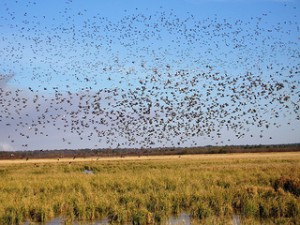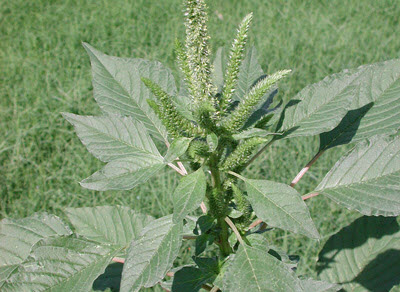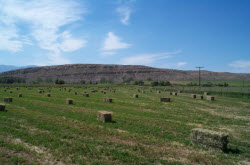Did you know that United States permits the planting of genetically engineered crops in the nation’s protected wildlife refuges? Environmental groups have challenged this practice one region at a time.
|
|
|||
|
This past November, the U.S. Environmental Protection Agency report cited “severe efficacy issues” with Monsanto’s Bt corn after multiple states reported “unexpected pest damage.” Faced with another government agency’s failure to follow the laws, advocate groups had to resort to the courts yet again, making the judicial system the last stopgap for even the most sensible environmental policy. Genetically modified crops reinforce genetic homogeneity and promote large scale monocultures, they increase vulnerability of crops to climate change, pests and diseases and thus contribute to the decline in biodiversity. In the age where 75% of our plant genetic diversity has been lost, we must ask whether GMOs are doing more harm than good. USDA often sides with and promotes industry interests. Its new pilot program allowing biotech developers to prepare their own safety studies or pay for those selected by the agency will only reinforce the image of an agency regulating for the industry. The Russian government is eager to sell off land that houses one of the world’s largest and oldest collections of seeds and plants — dosvidanya biodiversity. Conventional and organic farmers and environmental groups filed a lawsuit challenging the USDA’s decision to permit the unrestricted commercial release of genetically engineered alfalfa. A California Appeals Court reversed a lower court’s ruling which would have required the destruction of genetically modified sugar beet seedlings planted in September 2010. The usual and unusual politics surrounding the deregulation of genetically engineered alfalfa. In less than a month, USDA has approved for unrestricted growth GE alfalfa and partially deregulated GE sugar beets. Now, it deregulates GE corn for biofuel production with no environmental impact study of novel proteins it contains. Yesterday, USDA’s Sec. Tom Vilsack announced that genetically engineered alfalfa, that has been modified to withstand repeated application of Monsanto’s RoundUp herbicide, will be completely deregulated nation-wide, without any restrictions. GMOs have started to proliferate in Africa and other developing nations. The growth of GMOs in developing nations, however, brings to the forefront deeply rooted issues of social injustice. While Monsanto shelved its research on genetically modified wheat in 2004 amid broad opposition from consumers and growers, it’s back at it again. A look at the recent GMO stories, including a manifesto for changing the system of industrial food production and farming, also recent studies revealing the health hazards of GMOs. A settlement in GM rice contamination lawsuit. The tragedy of CAFOs in pictures. And more. Superweeds are invading fields across the globe. Before we start looking blaming farmers, however, careful attention must be paid to government agencies and seed companies and how the two partner-up to foster the conditions that lead to superweeds. AHPIS announced its response to a recent federal court decision which banned the planting of Monsanto’s GM sugar beets until the agency conducts an EIS. Many, however, see the agency’s response as an attempt to circumvent the court’s ruling. Last week, superweeds and GMOs were on the minds of many U.S. lawmakers. Reports continued on growing pesticide resistance. Bee colony collapse problem grows. EPA considers giving environmental justice a chance. EU approved more GM maize imports, while a GMO-Free Europe conference nears. And more. The United States Supreme Court handed down its first ever decision concerning genetically modified crops and it is a mixed result for farmers, consumers and environmental groups. From the company that brought you plastics and rubber (DuPont) comes a genetically modified soybean that is altered to exhibit alleged health benefits. The planting of GMOs in Brazil and Argentina — both among the world’s top producers of GM crops — indicates that growth in GM crop production has guaranteed neither wide-scale social acceptance of the technology nor benefits for small-scale farmers. Ignoring criticis and finding their concerns to be “unlikely,” on May 12, 2010 APHIS approved for continued field tests the planting of experimental genetically modified eucalyptus trees across seven states. The claims by biotechnology corporations that genetic engineering increases crop yields, and is therefore necessary to feed a growing world population, have also recently been refuted. Failure to Yield, a report by the Union of Concerned Scientists published in April 2009, is the first to evaluate in detail the overall yield effect of genetic engineering. Specifically, the report concludes “no currently available transgenic varieties enhance the intrinsic yield of any crops. The intrinsic yields of corn and soybeans did rise during the twentieth century, but not as a result of GE traits. Rather, they were due to successes in traditional breeding.” Monsanto has crops resistant to glyphosate. Bayer is selling cotton and soybeans resistant to glufosinate, another weedkiller. Monsanto’s newest corn is tolerant of both glyphosate and glufosinate, and the company is developing crops resistant to dicamba, an older pesticide. Syngenta is developing soybeans tolerant of its Callisto product. And Dow Chemical is developing corn and soybeans resistant to 2,4-D, a component of Agent Orange, the defoliant used in the Vietnam War. Monsanto claims that it is pursuing a legal battle over the right to grow genetically modified alfalfa because it is concerned with farmers, fairness and choice. Yet Monsanto’s appeals in the case have a lot more to do with protecting its right to continue selling GM seeds and pesticides. |
|||
|
 |
|||













